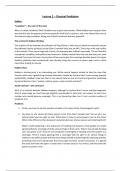Lecture 2 – Classical Positivism
Hobbes
”Leviathan” – the ruler of the state
Why is it called Leviathan? Well Leviathan was a great sea monster. What Hobbes was trying to show
was that this was the greatest and most powerful of all God's creations, and so he likened the ruler of
the state as being Leviathan, being one of God's creations and very powerful.
The context to Hobbes thinking
The English civil war between the followers of King Charles 1 (who was an absolute monarch) and the
Roundheads (mainly puritans) led by Oliver Cromwell (who was an MP). There was strife and conflict
in the country. There was a huge lack of trust, the economy was suffered very badly. The evil that this
caused was instability, both political and economic. Hobbes realised that the only way that you could
proceed if you were to have a true system of law was to give the sovereign absolute power to impose
stability politically and economically, and thereby bring the country to peace again and to allow
mercantile trading to resume.
Hobbes View
Hobbes's starting point is an interesting one. While natural lawyers tended to take the view that
human nature was a good thing because ultimately created by God and that it was moving towards
perfectibility, Hobbes's view was that in our natural state we are not moral and good but motivated
by animal desires: Life is “violent, solitary, poore, nasty, brutish and short”.
Social Contract – why contract?
Well, it's a contract because Hobbes imagines, although he realised that it never actually happened.
That at some stage we must have got together and decided to hand over our powers to one of our
number who would become sovereign. This is an interesting idea, but it has a certain number of
problems to it.
Problems
1. Firstly, you have to ask the question of what is the status of the ‘Pyschological’ myth?
2. You have to ask, where did these powers come from that I handed over? Do we all in our
natural state have the right to rule? What does it mean to hand powers over to the state?
What is the difference then between having handed over all your powers and retaining them?
What's really happening in this expression of handing over powers is that people are simply
agreeing that the sovereign shall do various things in their name. They're not actually handing
over any power at all. They are not losing their sovereignty in handing over their power to a
sovereign. They're simply agreeing that a sovereign shall be able to do various things in
relation to the political state and that those things should include things like imposing stability,
punishing crime and creating laws that encourage economic success and peace. It is agreed
the state shall have the right to create laws in certain areas to run armies, and they have the
power to punish crime.
, Balance between Despotism and Instability
What Hobbes does in his particular form of social contract is to force a balance between Despotism
and Instability.
He believes that if the power of the people is not utilised by the sovereign, there will necessarily be
instability, just as there was during the English civil war. On the other hand, if you hand over all the
powers to the sovereign, does this not give rise to despotism?
Hobbs is so scared of instability that he errs on the side of despotism and authoritarianism. For
Hobbes, we hand over ALL our powers to the sovereign reserving nothing to ourselves, and the
sovereignty holds our powers and is enabled to do everything that is needful for the protection of the
state and the imposition of stability.
Why? It would be intolerable if we held any powers we could use against the sovereign. For then the
sovereign would not really be sovereign. They can only be sovereign if they hold power and don’t have
anyone to whom they owe any duties or responsibilities, including responsibilities to the people.
Purpose of the law
For Hobbes, the purpose of the law is the creation of political and economic stability.
Downside: the law is only a power system used to control us. We therefore have no ability to question
the powers that the state uses.
Hume
Hume’s empiricism: excessive, gives the mind nothing to do.
Our knowledge should be proportioned to the evidence of our senses is a system which gives the mind
very little to do. It is as if a person is simply sitting in a darkened room, looking out of a window, and
the knowledge of what goes on outside comes through the window, strikes the eyes of the viewer,
and imposes knowledge in their mind. Of course, knowledge is not like that. Knowledge actually has
to be constructed by a process of analysis and commitment.
Hume’s non-cognitivism: you can’t derive an ought from an is …
What was most important for his criticism of natural law theory was Hume's non-cognitivism, as it is
often known. The principle that you cannot derive an ought from an is. You cannot get to moral
knowledge by looking at what our senses show us exists within this world.
Model of logical argument is the syllogism:
This is a two step argument which leads to a conclusion.
The first step is what's called a major premise, which is a description of all the things to which it relates.
The second step is a minor premise, which gives you an instance within the set of things to which the
major premise relates.





